Timeline: Indonesia since 1949
Key dates in the history of Indonesia from independence to the present.
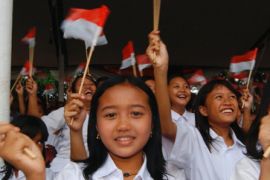
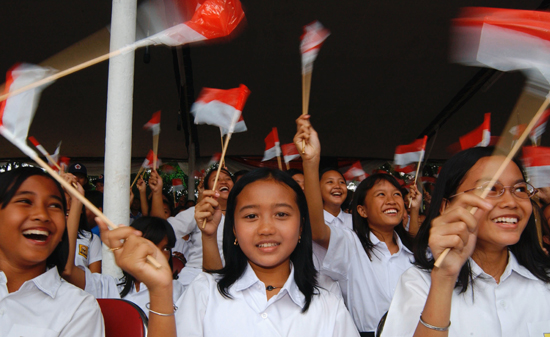 |
| Independence day is an important holiday in the Indonesian calendar [GALLO/GETTY] |
1949 – Indonesia achieves independence after four years of armed struggle against the Dutch. Nationalist leader Sukarno becomes Indonesia’s first president.
1963 – Sukarno launches three-year policy of military confrontation (Konfrontasi) with Malaysia over the future of Borneo island.
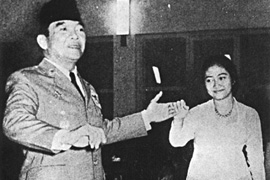 |
| Sukarno, Indonesia’s first president, with his daughter Megawati, the country’s fifth [AP] |
1965 – A failed coup attempt leads to the massacre of hundreds of thousands of Indonesian communists.
General Suharto, head of the army, takes power from Sukarno establishing the “New Order” government.
1969 – Indonesia formally takes control of Irian Jaya, now known as West Papua.
1975 – Indonesia invades the former Portuguese colony of East Timor.
An estimated 200,000 East Timorese die during Indonesia‘s 24 years of occupation.
1997 – The Asian financial crisis hits Indonesia hard. Food and fuel prices soar, triggering street protests and leading to Suharto’s resignation in 1998.
1998 – New president BJ Habibie says East Timor will be allowed a referendum on its future.
Economic problems fuel deadly inter-religious and inter-ethnic violence and Jakarta is rocked by frequent violent anti-government protests.
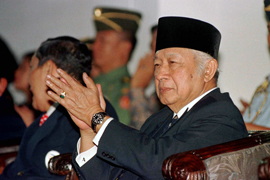 |
| Suharto ruled Indonesia for more than three decades [Reuters] |
1999 – Indonesia‘s first free elections are held, bringing in a new president, Abdurrahman Wahid.
A UN-backed referendum in East Timor votes overwhelmingly for independence, triggering a violent backlash from pro-Indonesian militias.
East Timor resistance leader, Xanana Gusmao, is released from jail in Jakarta shortly after the vote result is announced.
2001 – Ethnic violence breaks out in Kalimantan as indigenous ethnic Dayaks launch attacks on settlers from elsewhere in Indonesia. Hundreds of Madurese migrants are beheaded and mutilated.
With President Abdurrahman Wahid accused of corruption and incompetence, parliament forces him from power, swearing in Vice-President Megawati Sukarnoputri, daughter of founding president Sukarno, as the new leader.
2002 – Megawati joins other world leaders and the UN secretary-general at a ceremony marking East Timor‘s formal independence.
A nightclub bomb attack on the island of Bali leaves 202 dead, most of them foreign tourists. The attack is blamed on the Jemaah Islamiyah, a group accused of several other bombings and attacks in the region.
2004 – Susilo Bambang Yudhoyono, a retired general known popularly as SBY, wins Indonesia‘s first direct presidential elections, defeating Megawati in a second round run-off.
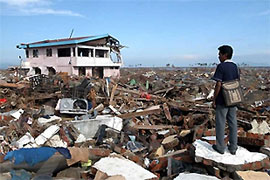 |
| Indonesia was the hardest-hit nation in the 2004 Asian tsunami [EPA] |
A massive undersea earthquake off the island of Sumatra triggers a deadly tsunami across the Indian ocean. The Indonesian province of Aceh is hit hardest, with an estimated 130,000 killed and 500,000 made homeless.
2005 – Government signs peace deal with Free Aceh rebels aimed at bringing an end to three decades of violence.
Three suicide bomb attacks in Bali leave 23 dead.
2006 – A powerful earthquake near the central Java city of Yogyakarta kills almost 6,000 people and leaves 1.5 million homeless.
Indonesia is hit by another deadly tsunami, this time on the southern side of the island of Java, killing at least 500 people.
Aceh holds its first direct elections, naming former rebel leader Irwandi Yusuf as governor.
2007 – Heavy rains bring widespread flooding to Jakarta, leaving hundreds of thousands of the city’s poorest residents homeless.
2008 – After years of ill health, former president Suharto dies. He is given a state funeral, despite protests from many Indonesians who say he stole billions of dollars in state funds for his family and business associates.